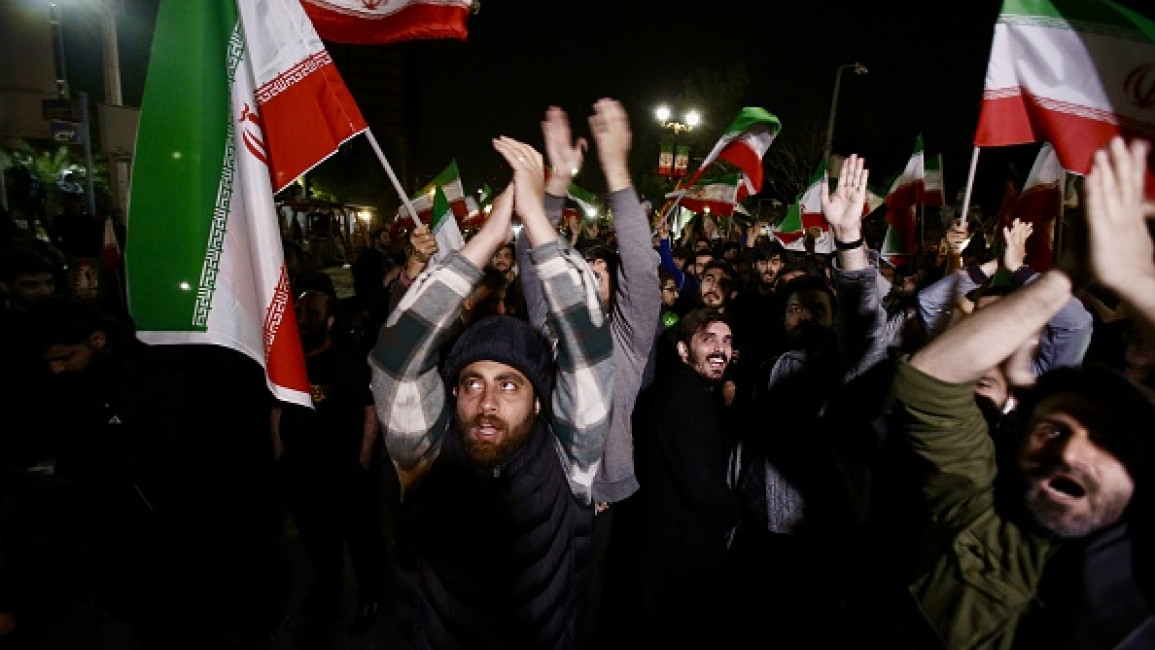How did Arabs react to Iran's attack on Israel?
Iran launched a large-scale drone and missile attack on Israel on Saturday night, in what is believed to be the country’s first direct military assault on Israeli territory.
The attack, which was in response to Israeli strikes on the Iranian consular building in Syria, has garnered a wide-ranging response from the region.
According to Israeli military officials, around 170 drones, 30 cruise missiles and 120 ballistic missiles were fired towards Israel, with several hitting Israeli air bases.
Arabs in the region were divided over the attack, with many taking to social media platforms to share their views with the Arabic hashtags for "Iran" and "World War III" trending widely.
'A strong message'
Palestinian writer Said al-Haj posted on X that the attack represented "a strong direct message without war" and a move leading to "breaking rules of engagement that have existed for decades", adding that it marked "a new phase in the region".
Lebanese writer Hassan al-Dorr said in an X post that Iran was "capable of protecting its national security on its own without the help of its allies in the region”, while Israel was "unable to protect itself without its allies!"
Prominent Al Jazeera TV anchor Jamal Rayan questioned: "Could Israel have repelled the Iranian missile and drone attack without the US and UK help?"
'A farce'
Meanwhile, Saudi user Majid al-Majid posted: "Israel lost a lot of Western sympathy and world public opinion after its crimes in Gaza. In one hour, Iran was able to restore the world’s sympathy to Israel and to [show it] as a victim of terrorism."
Egyptian Al Jazeera TV anchor Ahmed Mansour posted: "Would Israel and its allies succeed in using the Iranian response to turn it into a victim and try to restore international sympathy for Israel after six months of war crimes in Gaza."
Syrian Al Jazeera TV anchor Faisal al-Qasim posted: "Israel strikes Iran without warning and does not even announce its strikes after that. But Iran tells us the time of the drones’ departure and the hour of their arrival in Israeli territories in minutes and seconds. We do not know if they also informed Israel about the number and type of drones and missiles they carry and where they will drop them."
Backlash over Jordan's role
Iran's drones and missiles were intercepted by Israel, the US, the UK, France and Jordan.
Security sources cited by Reuters said that the missiles were intercepted near the Jordan Valley and a long the Jordan-Syria border.
"Some shrapnel fell in multiple places during that time without causing any significant damage or any injuries to citizens," a statement from the Jordanian cabinet read.
The move triggered a scathing response from people, who were surprised by Jordan’s response.
"The King of Jordan helped shoot down a handful of Iranian drones, this guy is supposedly an Arab leader and his wife is Palestinian. It doesn’t get more scandalous than that," one social media user wrote.
"It is painful that many comments in Hebrew celebrate Israel’s alliance with an Arab country. The common phrase is ‘the Jordanian regime has repeatedly proven that it is a strategic ally of Israel," another wrote.
Others pointed out the double standards in Israel’s response.
"It seems like, whatever it does, Israel’s always the victim. But what victim is allowed to go around killing whoever it wants?" journalist and author Jonathan Cook said.
Egypt’s Ministry of Foreign Affairs expressed "deep concern" following the attack, and called for maximum restraint.
The statement warned over the risk of the regional expansion of the conflict, adding that Egypt would be "in direct contact with all parties to the conflict to try and contain the situation".
The Lebanese group Hezbollah praised Iran’s attack, calling it a brave decision.
In the statement, they added that Iran had exercised its legal rights despite "threats, intimidation and pressure".
Yemen’s Houthis said the attacks were a legitimate response to the Israeli strike on the Iranian consulate in Damascus on 1 April.
Both Saudi Arabia and Qatar called for restraint, expressing deep concern over the escalation.
"The Ministry of Foreign Affairs urges the international community to take urgent action to defuse tension and de-escalate the situation in the region," a statement from Qatar read.



